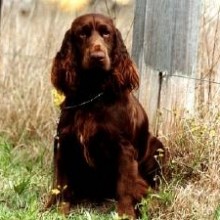Field Spaniel
Lifestyle Needs

The Field Spaniel is similar in many respects to a Cocker Spaniel with a slightly longer muzzle and back. He is definitely a country dog and would be unhappy living in a town or city. He needs a house with a garden and proximity to the open countryside. His hunting instincts remain intact and he will need plenty of exercise. His longish coat and feathering need frequent grooming to keep it clean and tangle free.
Genetic Diversity
(Known as Coefficient of Inbreeding: 'COI'. It should be as low as possible.)
The UK Kennel Club breed average COI is 18.1% - See 'A Beginners Guide to COI'
Gene Pool Size
(Known as Effective Population Size: 'EPS')
32
EPS is a measure of how many individuals are contributing genetically to a breed population. It is a measure of the size of the gene pool in a breed. Lower than 100 is considered critical by conservationists and below 50 brings a breed close to extinction. For more information see the Kennel Club article.
Health and Welfare Problems due to Conformation
(Body shape and physical characteristics)
- The Field Spaniels long and hairy ears would cause him problems if they are not checked daily for seeds and other debris. Wax may accumulate and lead to ear infections if not regularly cleaned.
BVA/KC Health Schemes: www.bva.co.uk/chs
- Hip dysplasia: breed mean score 10.5 (parents should be lower)
- Eye disease: Hereditary cataract (HC) (annual testing; Progressive Retinal Atrophy (PRA), (annual testing); Multifocal retinal dysplasia (MRD) (litter screening)
Estimated Breeding Values (EBVs) : No EBVs are currently available for this breed
www.thekennelclub.org.uk/about-ebvs
DNA Tests Available
DogWellNet and IPFD Harmonisation of Genetic Testing for Dogs (HGTD)
www.dogwellnet.com/breeds
- Acral mutilation syndrome
- Progressive Retinal Atrophy (PRA-prcd)
- Progressive Retinal Atrophy (crd 4 / cord 1)
Availability of a DNA test does not mean that it is always necessary or even desirable for breeders to use this test.
Other Breed-Specific Health Screening Schemes
- Heart testing
- Bitches not to give birth under two years of age
- No stud dog to be used under 12 months of age
- Bitches not to produce more than one litter within a 12 month period
Ask the breeder to show you the certificates for the above tests/screening for both parents. If any of the above tests have not been considered necessary by the breeder (and there may be good reasons), ask her to explain why.
Other Diseases Reported
(For which there are currently no genetic or screening tests for sire or dam)
Ear infections
Allergies
Skin irritation
Ask the breeder about the medical history of the parents, grandparents and great grandparents. Consider carefully whether to purchase a puppy if some of these or other diseases are in the family line.
Ask about the breeder’s policy in cases of serious genetic diseases occurring to your puppy in later life. Good breeders will request to be informed of such events in order to improve future breeding decisions.
You are strongly advised to buy from a breeder who uses (or is prepared to use) the AWF Puppy Contract and Puppy Information Pack (PIP): www.puppycontract.org.uk
The breeder should also be familiar with the CFSG/DBRG Code of Practice for Dog Breeding